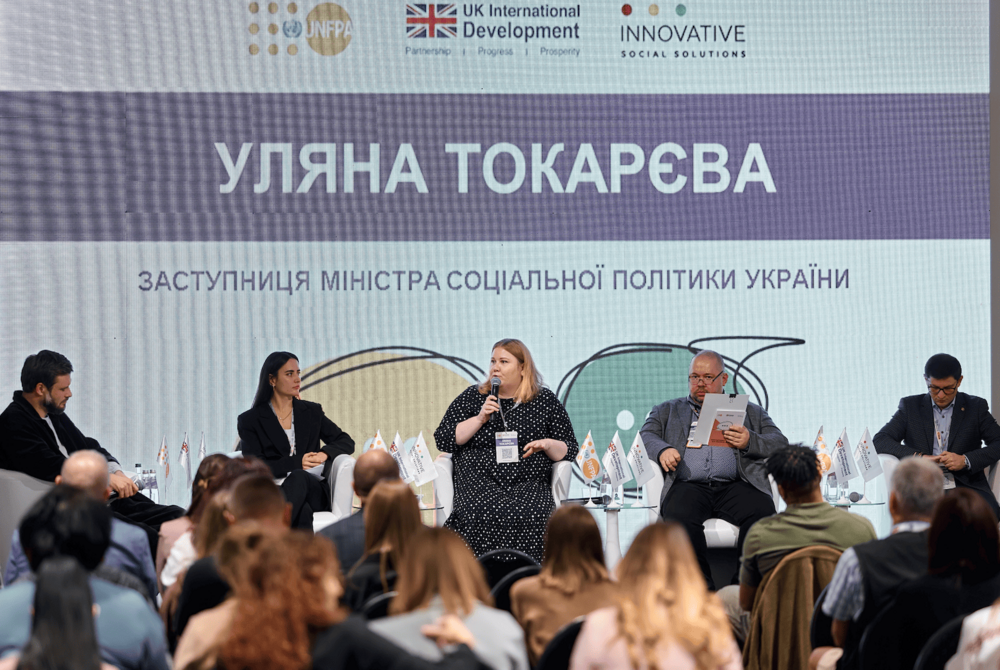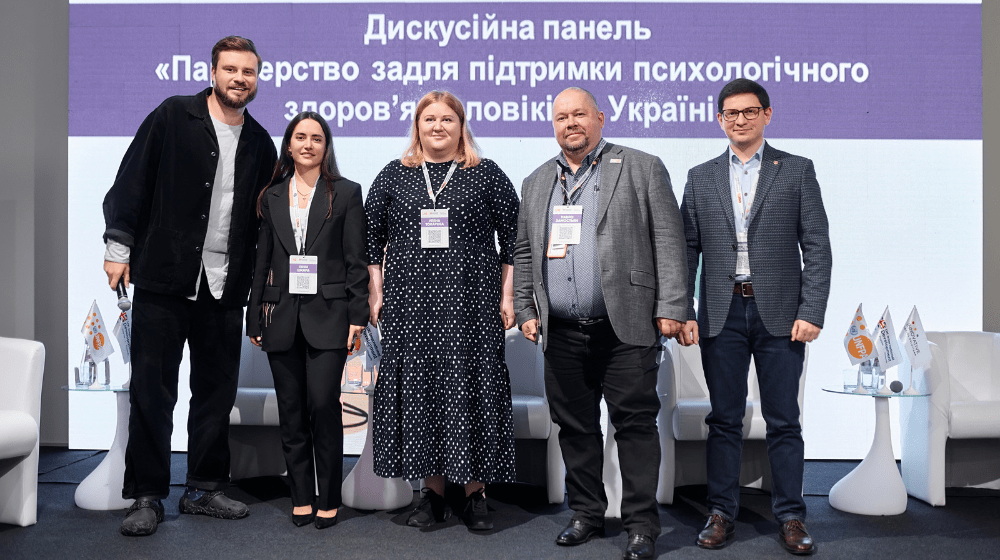The event was dedicated to the second anniversary of the 2345 Men’s Psychological Support Line. This project is implemented by UNFPA, the United Nations Population Fund in Ukraine, with support from the UK government and in cooperation with the NGO "Innovative Social Solutions."

Mental health is an essential part of every person’s well-being. Unfortunately, due to gender stereotypes or other biases, men often do not seek psychological support. During the war in Ukraine, the number of stressful situations has significantly increased, making timely resolution and overcoming psychological stress crucial.
To discuss and examine critical aspects related to protecting and supporting men's mental health since the full-scale war began in February 2022, the forum’s organizers brought together representatives from government and civic institutions working in the field of mental health, as well as opinion leaders and stars of Ukrainian sports.
Key topics of the event included the importance of effective coordination between civil society, international organizations, and the government to strengthen and develop a culture of care for men’s mental health in Ukraine, supporting men's psychological well-being as an effective method of combating and preventing domestic and gender-based violence, and opportunities to unite the efforts of the Ministry of Social Policy and the support line on this issue.
Opinion leaders and Ukrainian sports stars—Oleksandr Teren, veteran, writer, and author of the YouTube show “Vidval Nih,” Oleksandr Pedan, Ukrainian TV presenter and public figure, Bohdan Yadov, Ukrainian judo European champion, and Zhan Beleniuk, Ukrainian athlete, political figure, and Olympic Greco-Roman wrestling champion—shared personal experiences of coping with psycho-emotional challenges and discussed how their mental state impacts various aspects of life.
Today, one of the available tools for stabilizing the emotional state of Ukrainian men is the Men's Psychological Support Line at 2345. Over almost two years, specialists of the men's support line have processed more than 21,000 requests, conducted over 16,400 consultations, and changed the lives of 9,345 men and those they love.
Pavlo Zamostyan, Deputy Representative of UNFPA, United Nations Population Fund in Ukraine, said: “The need for psychological support for men, as an important element in preventing gender-based violence, was evident even before the war. The war has only increased the psychological burden on the population, particularly on men. This prompted us to take more active measures, and we launched a hotline for men in October 2022. It is known that men are less likely to seek help, especially psychological help, due to false stereotypes that a man should always be strong, have answers to all questions, and solve all problems on his own. It’s important to understand that timely psychological support can help a man avoid crossing a line and prevent conflict and violent behavior. It’s crucial that men trust the service provider, feel positive changes, and share their experiences with other men who have not yet dared to seek help. We believe we have achieved this over the two years of work. We thank our partners and the UK government for supporting this project.”
According to the project’s statistics, the most common issues raised by Ukrainian men are: — emotional problems (53.15%): anxiety disorders, depression, uncontrolled anger, mood disorders; — issues in romantic relationships (26.21%); — employment issues (17.35%); — addiction problems (11.85%); — problems related to military activities (11.84%), including fear of mobilization, separation from a loved one, loss of life direction; — domestic violence (9.58%), where ⅔ of the requests concern psychological violence; — suicide and homicide (8%).
According to the line's psychologists, there has been an increase in calls from military personnel and war veterans suffering from guilt, excessive emotionality, loss of self-control, and communication problems with loved ones.
During the event, Ulyana Tokarieva, Deputy Minister of Social Policy of Ukraine, noted: “Currently, 180 resilience centers are operating in Ukraine, where one can receive psychological help for free. Do men turn to these centers? Absolutely. The most common requests include solving family problems, the loss of a loved one, disorientation, panic attacks, overcoming PTSD, and fathers asking how to support their children. Divorce and addiction to alcohol and drugs are also frequent issues. It is essential for psychological support to be available at the community level. But it is equally important to implement other tools, such as the men's psychological support line. The Ministry of Social Policy is and remains ready to partner with anyone who wants to ensure accessible psychological services for both women and men.”
One of the services to which the support line directs men is the gender-transformative spaces for responsible fatherhood "TatoHub." A separate panel of the forum was dedicated to discussing changes in social roles in Ukrainian families and the transformation of men’s perceptions of fatherhood during the war. Specialists of the "TatoHub" project emphasized that modern interpretations of "responsible fatherhood" require fathers to possess skills and tools for effective stress management, emotional tension reduction, and stabilization of their condition. Even when a father is "at a distance," his psychological state directly impacts the emotional state of his children.
If you or your loved ones feel anxiety, despair, or are unable to manage negative emotions, you can contact the Men’s Psychological Support Line at 2345 (calls are free). You can also write to the anonymous online chat in Telegram, Facebook, or Viber, or leave a request on the project’s website. The line’s operators are available from 8 AM to midnight, providing anonymous, free, and qualified assistance to anyone who needs it.
The Men’s Support Line is funded with support from the UK government, provided through the Foreign, Commonwealth & Development Office, as part of the project “EMBRACE: Strengthening National and Regional Mechanisms to Build an Adaptive, Accountable, and Cost-Effective System to Combat and Prevent Gender-Based Violence,” implemented by UNFPA, the United Nations Population Fund in Ukraine, in partnership with the NGO "Innovative Social Solutions."
The "TatoHub" network is implemented by UNFPA in Ukraine with the financial support of the Government of Sweden and the European Union, in partnership with the Office of the Vice Prime Minister for European and Euro-Atlantic Integration and in cooperation with the NGO "Fishing Club of Ukraine."


